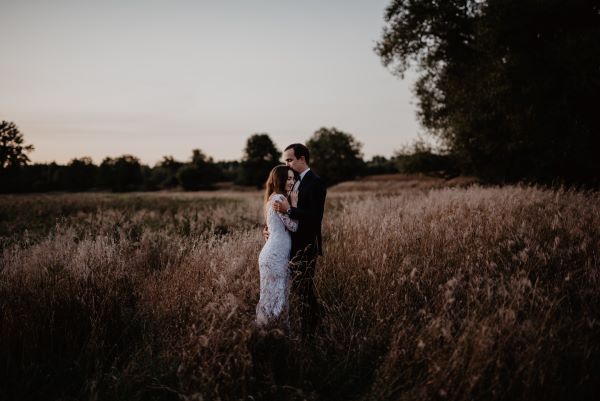The choices you make on your big day could inspire others to have a more sustainable wedding
When it comes to wedding planning, sustainability probably isn’t very high on the priority list for most couples. Or, at least, it hasn’t been in the past. Weddings used to be all about excess, a chance to celebrate your love in a loud, fun, over-the-top kind of way and to hell with the cost!
But, due perhaps in no small part to the pandemic, the wedding industry has changed quite a lot over the last few years. While many people opted to wait and reschedule their dates in order to have the ‘big day’ they always dreamed about, many couples were quite happy to just have 25 or 50 people around them as they exchanged vows.
It turns out that we don’t need ‘all the trimmings’ to have an amazing, memorable day so if you can do something that saves time, stress, money and the planet, wouldn’t you want to do it?
Below, Irish entrepreneur Olivia Buckley runs her own luxury wedding and events agency and has shared her top tips on how to have a more sustainable wedding.
To find unique ideas for an upcoming wedding , such as how to incorporate Irish heritage into your big day, pick up the latest issue of Irish Country Magazine, out now.
1. Wear pre-loved wedding attire
Choosing pre-loved or vintage wedding clothes is a wonderful way to reduce waste and promote sustainability. Not only is this a more environmentally friendly choice, but it also allows the bridal party to incorporate unique and timeless pieces into their wedding look. There are many websites that sell pre-owned wedding dresses or you could add a vintage skirt, veil or headpiece to your look that once belonged to a family member.
2. Eco-friendly wedding invites
Wedding invitations set the tone for the big day ahead and by choosing eco-friendly invitations or e-vites, the bridal party can make a positive impact on the planet. Eco-friendly paper options include recycled, tree-free, and vegetable-based inks. For those who prefer a digital option, e-vites are a great choice, as they eliminate paper waste and can easily be customised.
3. Choose a green wedding venue
A green wedding venue is another way to be more sustainable in wedding planning. However, it will require a little bit of research on your part to ensure the company’s claims are legitimate. To identify a green venue, look for places that practice eco-friendly habits such as recycling and composting, using renewable energy, and sourcing of local products. Outdoor venues can also be a great option, as they use less energy and take advantage of natural lighting.
4. Use eco-friendly décor
Not only is this good for the planet but it will give your day a unique and slightly rustic theme that will look divine in photographs. Keep an eye out for decor made from recycled, biodegradable, or sustainable materials, such as bamboo or organic cotton. Avoid materials like plastic and Styrofoam that can take hundreds of years to decompose. Choose centrepieces that can be repurposed or donate them to a local shelter or nursing home after the wedding. Opt for LED lighting as these reduce energy use and create a romantic ambiance – win/win.

5. Eco-florists and repurposing flowers
Selecting an eco-florist and repurposing flowers is a great way to ensure that the wedding celebration is environmentally friendly. Eco-florists prioritize the environment by using sustainable materials, composting, and minimizing waste. They also source their flowers locally and seasonally, which reduces the carbon footprint associated with transportation. However, if you don’t have an eco-florist in your area, repurposing flowers can also help reduce waste. For example, ceremony flowers can be reused in the dining space or used as centrepieces.
6. Reduce transport emissions
This is a really simple one! Consider holding the ceremony and reception at the same location to reduce the need for transportation. If that’s not possible, choose a venue that’s easily accessible by public transport (provide the information to your guests) or encourages carpooling. Brides and grooms can also opt for eco-friendly transportation, such as a bicycle or a horse-drawn carriage. And again, think of the pictures.
7. Donate leftover food
There is often a lot of leftover food at a wedding and donating it is a fantastic way to reduce waste and support those in need. To achieve this, work with the venue or wedding planner to identify a local food bank or charity that accepts donations. Coordinate with them beforehand to ensure that the food is properly stored and transported to the organization. Choose to serve buffet-style meals to avoid over-ordering and minimize food waste. Inform guests ahead of time that you’ll be donating the leftover food and invite them to participate in this meaningful act of giving.

8. Recycled metals, ethical gemstones and vintage jewellery
By choosing a wedding band that uses recycled metals and ethical gemstones, you are supporting sustainable jewellery practices. These are mined and produced in ways that minimize harm to the environment and human rights violations. Vintage jewellery is also a unique and eco-friendly option, as it allows the wedding party to wear a piece of history while reducing waste. If you don’t have any family heirlooms, you can look for jewellers who specialize in sustainable and ethical practices, or search for vintage and antique jewellery at second-hand stores or online marketplaces.








